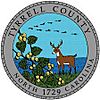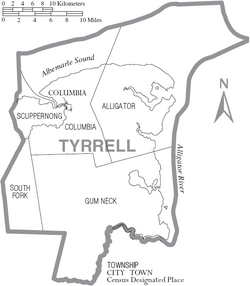Tyrrell County, North Carolina facts for kids
Quick facts for kids
Tyrrell County
|
|||
|---|---|---|---|
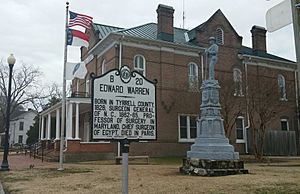
Tyrrell County Courthouse in Columbia
|
|||
|
|||
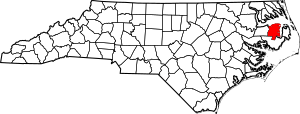
Location within the U.S. state of North Carolina
|
|||
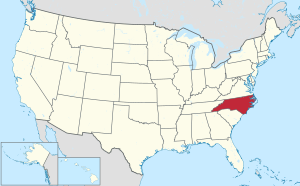 North Carolina's location within the U.S. |
|||
| Country | |||
| State | |||
| Founded | 1729 | ||
| Named for | Sir John Tyrrell | ||
| Seat | Columbia | ||
| Largest community | Columbia | ||
| Area | |||
| • Total | 597.18 sq mi (1,546.7 km2) | ||
| • Land | 390.78 sq mi (1,012.1 km2) | ||
| • Water | 206.40 sq mi (534.6 km2) 34.56% | ||
| Population
(2020)
|
|||
| • Total | 3,245 | ||
| • Estimate
(2023)
|
3,461 | ||
| • Density | 8.30/sq mi (3.20/km2) | ||
| Time zone | UTC−5 (Eastern) | ||
| • Summer (DST) | UTC−4 (EDT) | ||
| Congressional district | 1st | ||
Tyrrell County (/ˈtɛərɪl/ TAIR-il) is a county located in the U.S. state of North Carolina. As of the 2020 census, the population was 3,245, making it the least populous county in North Carolina. Its county seat is Columbia. The county was created in 1729 as Tyrrell Precinct and gained county status in 1739.
Contents
History
The county was formed in 1729 as Tyrrell Precinct of Albemarle County, from parts of Bertie Precinct, Chowan Precinct, Currituck Precinct, and Pasquotank Precinct. It was named for Sir John Tyrrell, one of the Lords Proprietors of Carolina.
With the abolition of Albemarle County in 1739, all of its constituent precincts became counties. In 1774, the western part of Tyrrell County was combined with part of Halifax County to form Martin County. In 1799, the western third of what remained of Tyrrell County became Washington County. In 1870, the half of Tyrrell County east of the Alligator River was combined with parts of Currituck County and Hyde County to form Dare County.
Geography
According to the U.S. Census Bureau, the county has a total area of 597.18 square miles (1,546.7 km2), of which 390.78 square miles (1,012.1 km2) is land and 206.40 square miles (534.6 km2) (34.56%) is water. Tyrrell County, due to its proximity to the Outer Banks, has been designated as part of the Inner Banks.
Wildlife in the county includes bears, red wolves, and pitcher plants.
National protected area
- Pocosin Lakes National Wildlife Refuge (part)
State and local protected areas
- Alligator River Game Land
- Alligator River Area Outstanding Resource Water (part)
- Buckridge Coastal Reserve Dedicated Nature Preserve
- Buckridge Game Land
- Emily and Richardson Preyer Buckridge Coastal Reserve
- Emily and Richardson Preyer Buckridge Reserve (part)
- J. Morgan Futch Game Land
- Lantern Acres Game Land (part)
- New Lake Game Land
- Palmetto-Peartree Preserve
- Pettigrew State Park (part)
- Texas Plantation Game Land
Major water bodies
Adjacent counties
- Perquimans County – north
- Pasquotank County – north
- Camden County – north
- Currituck County – northeast
- Dare County – east
- Hyde County – south
- Washington County – west
- Chowan County – northwest
Major highways
 US 64
US 64
 US 64 Bus.
US 64 Bus. NC 94
NC 94
Demographics
| Historical population | |||
|---|---|---|---|
| Census | Pop. | %± | |
| 1790 | 4,826 | — | |
| 1800 | 3,395 | −29.7% | |
| 1810 | 3,364 | −0.9% | |
| 1820 | 4,319 | 28.4% | |
| 1830 | 4,732 | 9.6% | |
| 1840 | 4,657 | −1.6% | |
| 1850 | 5,133 | 10.2% | |
| 1860 | 4,944 | −3.7% | |
| 1870 | 4,173 | −15.6% | |
| 1880 | 4,545 | 8.9% | |
| 1890 | 4,225 | −7.0% | |
| 1900 | 4,980 | 17.9% | |
| 1910 | 5,219 | 4.8% | |
| 1920 | 4,849 | −7.1% | |
| 1930 | 5,164 | 6.5% | |
| 1940 | 5,556 | 7.6% | |
| 1950 | 5,048 | −9.1% | |
| 1960 | 4,520 | −10.5% | |
| 1970 | 3,806 | −15.8% | |
| 1980 | 3,975 | 4.4% | |
| 1990 | 3,856 | −3.0% | |
| 2000 | 4,149 | 7.6% | |
| 2010 | 4,407 | 6.2% | |
| 2020 | 3,245 | −26.4% | |
| 2023 (est.) | 3,461 | −21.5% | |
| U.S. Decennial Census 1790–1960 1900–1990 1990–2000 2010 2020 |
|||
2020 census
| Race | Number | Percentage |
|---|---|---|
| White (non-Hispanic) | 1,879 | 57.9% |
| Black or African American (non-Hispanic) | 934 | 28.78% |
| Native American | 5 | 0.15% |
| Asian | 43 | 1.33% |
| Other/Mixed | 112 | 3.45% |
| Hispanic or Latino | 272 | 8.38% |
As of the 2020 census, there were 3,245 people in Tyrrell, making it North Carolina's least-populous county.
Demographic change
Tyrrell County's population peaked in 1940 with 5,556 residents. The population subsequently declined to about 4,000 residents, where it remained for several decades before shrinking further due to outmigration fueled by diminished job opportunities. Between the 2010 and 2020 censuses, Tyrrell's population dropped by 26 percent, the largest population drop by percentage in the state.
Economy
Tyrrell County's economy is heavily reliant on agriculture—with its largest crop being potatoes — as well as forestry and fishing. The county also hosts a small tourism industry centered around hunting, fishing, and bird watching. It suffers from high poverty and food insecurity rates.
Communities
Town
- Columbia (county seat and largest community)
Townships
- Alligator
- Columbia
- Gum Neck
- Scuppernong
- South Fork
Unincorporated communities
- Fort Landing
- Frying Pan
- Jerry
- Pleasant View
- Kilkenny
See also
 In Spanish: Condado de Tyrrell para niños
In Spanish: Condado de Tyrrell para niños



